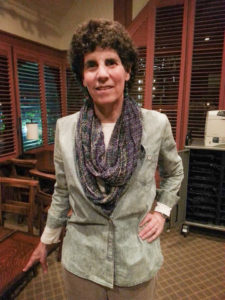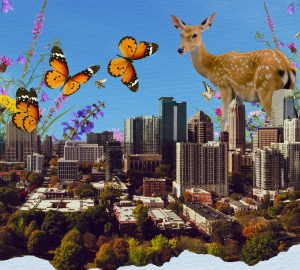Melissa Faye Greene discusses a hushed-up southern outrage in ‘Praying for Sheetrock’

Nonfiction author Melissa Faye Greene spoke about her first novel “Praying for Sheetrock” at Ivy Hall at 6:30 p.m. on Feb. 4. The book took 15 years to write and was published in 1991. Greene is known for writing books based on true Georgian tragedies such as “The Temple Bombing” and “Last Man Out: The Story of the Springhill Mine Disaster.” She has also been inducted into the Georgia Writer’s Hall of Fame at the University of Georgia.
Greene discussed her inspiration and research process while writing “Praying for Sheetrock” in her early twenties. The novel details the struggle of the black inhabitants of rural McIntosh County, Ga. in the 1970s to obtain equal rights with white people by suing the county for prejudice. At the time, McIntosh County was dominated by the ominous Sheriff Poppell, a man rumored to be involved with drug smuggling, prostitution, gambling in illegal stores known as “clip joints” and even murder along the southeast coast. African-Americans Thurnell Alston, Sammie Pinkney and Reverend Nathanial Grovner were the three men who lead the civil rights movement against the sheriff and corrupt law officers in Darien, Ga.
While discussing her book, the author delved deeper into some of the shocking felonies that took place in this overlooked county. For example, Greene stated that the headquarters for criminal activity in those parts was the S&S truck stop where you couldn’t get gas or your oil changed but could gamble, buy an illegal firearm and hire a prostitute. Greene also spoke of the numerous truck breakdowns in McIntosh County that resulted in stolen goods such as the infamous Snickers semi-trailer that crashed and caught fire. Even though officials deemed the Snickers as un-eatable, the candy bar soon surfaced in every home as locals switched from offering houseguests iced tea to Snickers on a platter with the wrapper half-torn off.
The central conflict Greene establishes in “Praying for Sheetrock” is the continued legal exclusion of the black community from county politics 20 years after the height of the civil rights movement. Even though 100 percent of the county’s black citizens were registered to vote, law enforcement officers would ask black voters absurd questions to prevent them from voting such as “how many bubbles are in the Alabama river?” In addition, Greene stated that the public school board was 100 percent white but the students were 100 percent black and received secondhand supplies and outdated textbooks.
Over the course of the story, Greene interviews McIntosh County locals and captures the setting and distasteful aura of the backwards community. Greene spoke rapidly but clearly while relating her experiences with getting to know the residents and the problems the black community faced.
When asked how long it took Greene to gain the black inhabitants’ trust, Greene responded that “It actually didn’t take long. I inherited their trust from being a part of the legal aid lawyers.” Greene added that “In the black community, it was great news that I didn’t look like or sound like the white people they knew.” The Jewish author also remarked that “racism and anti-Semitism go hand and hand,” and that “the black community understood me to be an outsider like them.”
Thurnell Alston’s wife, Becca, was Greene’s first friend in Darien. Greene stated that Becca would always say “Melissa ain’t white.” Alston became the first black county commissioner in Darien, a victory for the black community until he became involved with drug dealing and was sentenced to 78 months in a federal prison camp in 1986.
After the novel was released, Greene noted that “The only place to buy ‘Praying for Sheetrock’ in McIntosh County was in black businesses.” She added that for years after writing the novel, she received hate mail from mainly white readers with complaints like “I’m not saying it wasn’t true, but why did you have to write about it?”
“Praying for Sheetrock” picks apart a real-life bucolic Georgian county rooted in racism which Greene was brave enough to tell.


























